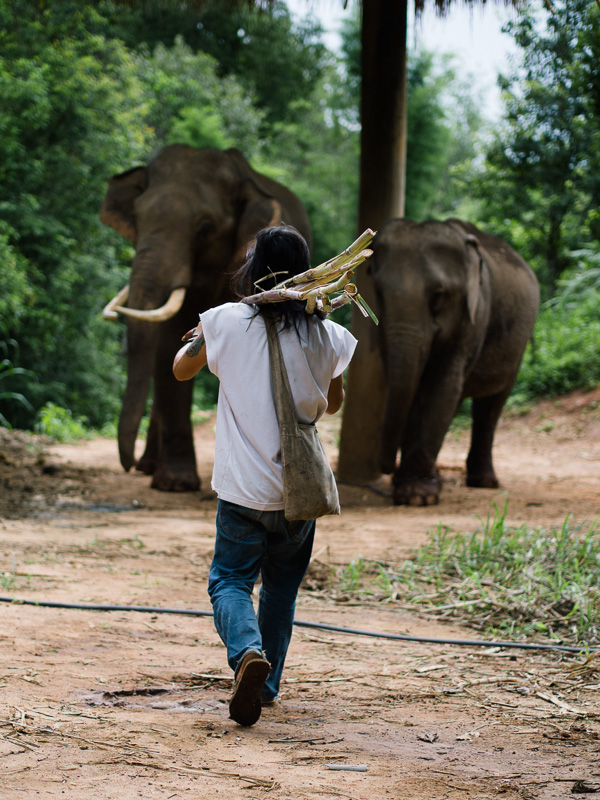One of the most beloved activities for tourists traveling in Thailand is to ride on elephants. The camps offer fun interactions like watching elephants paint, feeding bananas to baby elephants, and mini treks through the jungle. People are likely familiar with the criticisms environmental and animal-friendly folk level toward these camps for the maltreatment of elephants—but what these critics almost always miss is the elephants’ most trusted companion: their caretakers, the mahouts.
Mahouts used to hold a much more revered and well-paid position in society, due to the degree of expertise, experience, and physical strength it takes to work so closely with such large, intelligent, sensitive—and dangerous—animals. In the best scenarios, the mahout and elephant develop a lifelong bond of love and trust through which they can work together. However, the increasing demand for cheap tourist attractions drives prices down and caretakers are forced to take work well below the minimum wage.
What This Means For Elephants And Their Caretakers
Elephants are powerful animals that can attack each other and humans—even more so when they are males in musth. Most people would not put their lives on the line for 6000 baht (less than $200) per month. So these jobs are often filled by undereducated, inexperienced, and unprotected people from ethnic minority groups, like Karen refugees fleeing persecution in Myanmar. As refugees, they usually lack money and legal access to work and public education. The Karen language is also very different from Thai, which makes it even more difficult to assimilate. However, in Thailand, they often also face intense discrimation and rights violations. We’ve discussed the link between statelessness and trafficking before, and how it impacts some of our scholarship students. As stateless people, as undocumented workers, or as ethnic minorities (even with documentation), many mahouts are exploited, taking on extremely dangerous and frequently lethal work with incredible risks for almost no pay.
The high demand for cheap tourist attractions places stress on both the elephants and the mahouts. As the example in this Atlantic article shows, it can lead to deadly encounters where mahouts are killed, and their families are left even more vulnerable. Meanwhile the tourists who participate in these attractions vilify the mahouts (who not only make these attractions possible but also serve as the only protection between the elephants and tourists), thanks to misguided animal rights’ movements that spread misinformation and emotive rather than well-informed calls to action. These help neither the elephants nor their caretakers.
WHAT TO DO BETTER
In writing this article, I spoke with Alexandra Bay, founder and owner of Chai Lai Orchid Eco Lodge and Daughters Rising, which provides income, housing, job training, and language classes to women and men at risk of trafficing AND helps to improve the lives of elephants by offering more ethical tours and treks. As Bay explains, “The wellness of elephants and the men who take care of them are completely interdependent. On that principle, we work with elephant caretakers to empower them through education and fair wages. We provide them with a knowledge of their rights and also best practices for taking care of the elephants so they can both be happier and healthier.”
For some of the young men who start working with elephants, the job is not their first choice. They’re often nervous of the elephants at first and want to rely on more aggressive means of control. With the help of more experienced mahouts, they can learn that the best way to control their elephant is by building a trusting relationship and learning to read the animal well. For example, if an elephant is showing signs of stress, the mahout can recognise that quickly and defuse the situation non-violently by removing the elephant from the stressor. This obviously helps the mahouts, too, because it makes them feel a lot safer, and enables them to enjoy their job a lot more.
“We also do whatever is in our power to advise the mahouts of how to make sure their documentation is all above board, so that they have as much job security as possible. Most mahouts are sending a sizeable portion of their small wages home to their families. It’s important for them and their families that they know they have a right to be in Thailand and have a sense of stability in their lives.” –Alexandra Bay
What Tourists Can Do If They Want to Help Both Elephants and Their Caretakers When They Visit Thailand
Many tourists have no idea that there are labor abuses going on all around them – and they’re in vacation mode, so human rights aren’t necessarily at the forefront of their minds. Based on her experience working with indigenous groups and the animals they care for, Bay offered some recommendations to consider:
“I wish people knew that the mahouts are not evil! They aren’t trying to exploit animals or cause harm. They are just trying to find gainful employment which will help them to survive in a world that is often pitched against them. I’ve seen some really beautiful relationships between mahouts and the elephants they look after. It’s like family.” –Alexandra Bay
Don’t treat mahouts as though they are invisible—and don’t abuse them. Notice them. Talk with them. Most Karen people are shy about speaking English but you can try to talk with them and encourage them as they practice this skill. Chai Lai’s staff say that positive interactions with tourists reinforce their sense of dignity and help make the day more pleasant.
Respect the elephants. They may be your spirit animal, but they are still 5 ton animals who need personal space. And respecting the elephants may help prevent needless deaths and injuries for their mahouts.
Support small, community-based companies. To support conservation, Chai Lai Orchid has a policy of not buying elephants. When an elephant camp or sanctuary gives a large sum of money (60,000 USD) to an owner who exploits elephants, it actually fuels the cycle of trafficking wild elephants from the jungle. Wild baby elephants (not domestic or captive ones) are beaten and tortured into submission to be trained. Wild elephants are endangered, so it is very important not to contribute to anything that results in the purchase of elephants. Domestic elephants are trained holistically over time, and some may not even be separated from their mothers. Don’t support sanctuaries who buy elephants.
Avoid organisations that use words like ‘rescue’ and ‘save’, or which project their founders as heroes. Instead look for companies which work sustainably, with and through their local community, to enact grassroots change. Not only does this help reinforce the dignity of the local community, once you’ve found a more ethical organization, they are usually glad to direct you to other organisations whose work they respect and appreciate. Good NGOs and social businesses understand that our work is collaborative – the success of one should not obstruct the success of another.
Check your privilege. Even though you are traveling to experience a foreign culture, you may still be (and probably are unknowingly) influenced by cultural imperialism. Racist stereotypes and “otherization” enables sex tourists to buy young women and feel like they are saving them or helping them. Likewise, racist stereotypes and “otherization” allow people to vilify mahouts while imagining they are saving the elephants. Always be ready to learn and open your mind, and be prepared for the fact that the process might not always be a comfortable one.
Look more deeply and critically at the issue. A great deal of misinformation on social media about captive elephants is spread due snap judgements and lack of knowledge. Of course, the ideal would be for there to be no elephant tourism and for all elephants to be able to roam wild, but that is simply not the case. There are no designated sanctuaries, so elephants must be chained at night to prevent them from roaming, damaging crops, and hurting people or themselves.
“Most people who criticize and even vilify elephant tourism camps focus on two activities of traditional keeping, shows and rides, and two pieces of equipment, chains and elephant hooks. Most critics come from countries which have elephants confined in zoos, fortresses where the elephants are separated from the public by millions of dollars of walls and moats and where elephants are controlled by hydraulic gates and chutes. Clearly, massive enclosures are a luxury which Asian countries do not have and cannot afford. Further, zoo enclosures can be argued as worse for elephants then being on a long chain in a natural environment where they get lots of exercise and can feed on a wide variety of fresh wild plants. These activities and tools should be analyzed before condemning them. They are not the pure torture they are often painted to be.” –Naka Elephant Foundation
The question then becomes about implementing the best possible practices that consider the welfare of both the animals and the people who spend their whole lives caring for them. Many visitors are uninformed about the history of elephants in Thailand, the circumstances that led to the growth of elephant camps and the reality of caring for captive elephants vs. the small population of wild elephants. But they still write blogs and social media posts about the welfare of elephants that often cause more damage than good.
Advocate for fair wages and ethical working conditions for the caretakers. Wages and practices should facilitate a respectful and loving bond between the elephant and their caretaker, based on experience, expertise and trust, where neither is stressed out, exploited, or abused.
“I think some people’s feelings about elephants are based on an idea of the world which is so far from representative of today’s reality. Actually, the best way to serve both elephants and the community is not to sit and wish that elephants were still wild and free, but to respond pragmatically and positively to the situation we’re actually in. We need to acknowledge that we’re all part of the same wider eco-system – economically, environmentally, socially, spiritually – and by doing small things to improve each other’s lives, we can make a big difference over time.” –Alexandra Bay
To learn more, visit Chai Lai Orchid’s website!
UPDATED: A previous version of this article stated the price for elephants can be 60,000 THB. It has been edited to say 60,000 USD. It also stated that domestic elephants were not separated from their mothers, however, separation does happen in captivity and in the wild. With gratitude to John Roberts at Anantara Resort & Four Seasons Tented Camp for the suggested edits.






